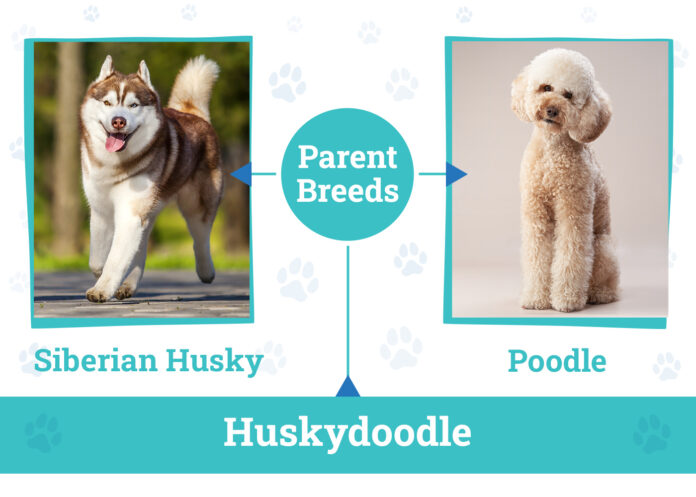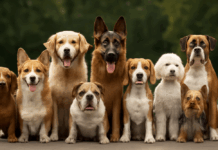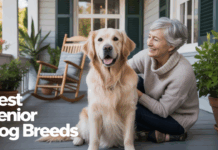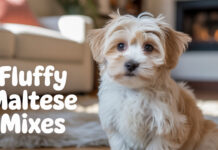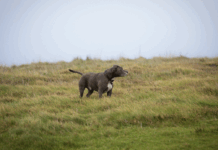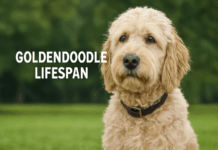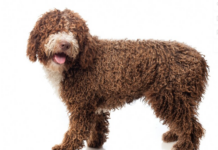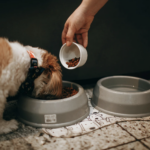Last Updated on August 6, 2024 by Dog Lover
Huskydoodle Overview: Characteristics, Care, and Fun Facts
The Huskydoodle, a delightful blend of Husky and Poodle, captures the hearts of dog lovers with its unique appearance and vibrant personality.
If you’ve come across Huskydoodle puppies or spotted them at a shelter, you might be eager to know more.
This guide will dive into everything you need to know about Huskydoodle care.
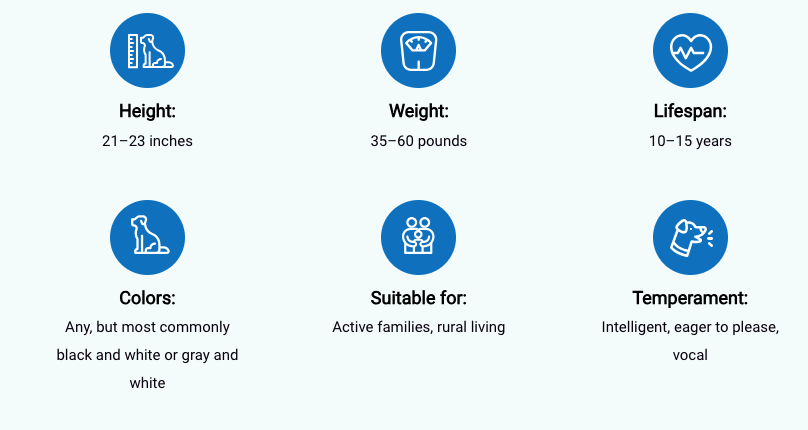
Breed Overview
- Height: 21–23 inches
- Weight: 35–60 pounds
- Lifespan: 10–15 years
- Colors: Any, commonly black and white or gray and white
- Suitable For: Active families, rural living
- Temperament: Intelligent, eager to please, vocal

Characteristics of the Huskydoodle
A Huskydoodle combines the best traits of both the Husky and the Poodle. The Husky, known for its hilarious vocalizations and loyalty, meets the Poodle’s dignity and intelligence in this hybrid breed.
While Huskies are versatile working dogs, Poodles are famed for their hypoallergenic coats. The result? A lively, charming dog with a mix of these wonderful traits.
Huskydoodle Puppies: What to Expect
Huskydoodle puppies bring a mix of high energy and curiosity. Given their parent breeds’ contrasting traits, predicting a puppy’s exact personality can be challenging.
Both Poodles and Huskies require significant attention and exercise, especially when young. Expect a playful, adventurous dog who thrives on stimulation and interaction.
Huskydoodle Origin & History
The Huskydoodle originated from the mix of Huskies and Poodles, breeds with very different histories.
Huskies, used as sled dogs in Siberia, contrast sharply with Poodles, which have roots as duck-hunting dogs in Germany.
The exact inception of the Huskydoodle is unclear, but it likely emerged in the 1980s as hybrid breeding gained popularity.
Temperament & Intelligence
A Huskydoodle’s temperament can vary depending on which parent breed’s traits are more prominent.
If the dog leans towards the Husky side, expect a vocal and energetic pet. If it resembles the Poodle, it may be more laid-back but still active.
Both breeds are highly intelligent, so the Huskydoodle will require mental and physical stimulation.
Are Huskydoodles Good Family Dogs?
Yes, Huskydoodles are great for active families.
They need constant engagement and thrive in energetic households. However, if your lifestyle is more sedentary, this breed might not be the best fit.
Getting Along With Other Pets
Huskydoodles generally get along well with other dogs and might cohabit peacefully with cats if raised together.
Early socialization is essential, but caution is advised with smaller animals due to potential prey drive.

Huskydoodle Care: Food, Exercise, and Training
Food & Diet
Huskydoodles are active dogs that need a balanced diet to match their energy levels. High-quality, protein-rich food is ideal.
Some owners opt for fresh or raw food diets, but always consult your vet for personalized advice.
Exercise
Daily exercise is vital for Huskydoodles.
They require about an hour of activity each day. Interactive games and varied activities can help keep them mentally stimulated and physically fit.
Training
Training a Huskydoodle is relatively straightforward due to their intelligence and eagerness to please.
However, be prepared for some challenges, especially if the dog inherits a strong-willed streak. Consistency and patience are key.
Grooming
Grooming is a daily necessity for Huskydoodles. They may inherit shedding traits from the Husky side and tangling issues from the Poodle side.
Regular brushing is crucial to prevent matting. Baths should be infrequent to avoid skin problems.
Health and Conditions
Huskydoodles can inherit health issues from either parent breed. Routine vet visits are essential to monitor their health.
Common conditions include luxating patella and progressive retinal atrophy. Serious conditions may include Addison’s disease and hip dysplasia.
Male vs Female Huskydoodles
Visually distinguishing between male and female Huskydoodles can be tricky. Males might be slightly larger, but personality varies more widely.
Spaying or neutering is recommended to prevent unwanted behaviors.
3 Fascinating Facts About Huskydoodles
- Eye Color Variation: Some Huskydoodles may inherit heterochromia, where each eye is a different color.
- Coat Variety: The coat may vary widely, from curly to wavy or straight.
- Size Variation: The size of a Huskydoodle can vary based on whether the Poodle parent was a toy, miniature, or standard Poodle.
Final Thoughts
The Huskydoodle is an intelligent, lively, and people-oriented dog. They thrive in active families and enjoy socializing with other dogs.
Early socialization and consistent care are crucial for a happy and well-adjusted Huskydoodle.
FAQs About Huskydoodles
What is a Huskydoodle?
A Huskydoodle is a hybrid breed resulting from crossing a Siberian Husky with a Poodle. This mix combines the Husky’s energy and vocal tendencies with the Poodle’s intelligence and hypoallergenic coat, creating a unique and dynamic dog.
How much exercise does a Huskydoodle need?
Huskydoodles are highly active dogs that require about an hour of exercise each day. Engaging in interactive games and activities helps keep them physically fit and mentally stimulated.
Are Huskydoodles good with children?
Yes, Huskydoodles are generally great with children. They are playful and energetic, making them suitable for active families. However, early socialization and training are crucial to ensure they are well-behaved around kids.
How often should I groom my Huskydoodle?
Huskydoodles require daily grooming due to their potential shedding and tangling. Regular brushing helps manage their coat and prevent matting. Baths should be infrequent to avoid stripping natural oils from their skin.
What health issues should I be aware of with a Huskydoodle?
Huskydoodles can inherit health issues from both parent breeds. Common conditions include luxating patella and progressive retinal atrophy. More serious conditions may include Addison’s disease and hip dysplasia. Routine vet check-ups are essential to monitor their health.
Sources
For further information on Huskydoodles and their care, check the following resources:
